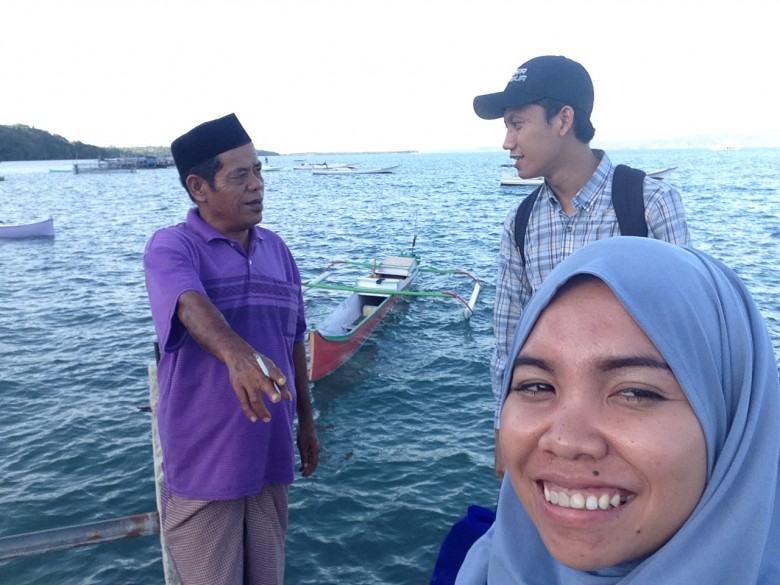
Lisda Haryani with Jamaluddin Fitrah Alam and a coral reef fisher at Kahu-kahu village in Selayar (photo: Lisda Haryani)
Pelagic fishing a strong option to alleviate pressures on local communities in Selayar
December 10 2016
Heavy fishing of coral reefs has had a serious effect on coral reefs in Selayar, the CCRES project’s pilot site in Indonesia. With most smaller villages relying on fishing for their livelihood, local communities find themselves facing increasing levels of poverty in light of declining reef ecosystems.
The punishing effects of reef ecosystem damage have made sustainable management of coral fishing more important than ever. One solution being looked at by CCRES researchers in Component 1 – Valuation of ecosystem services is encouraging movement from local fishers away from the coral reef and towards the open sea.
Research led by Masters student Lisda Haryani from Hasanuddin University looked into the situation of six local villages in Selayar to gain an understanding of the pressures currently felt by reef fishers and their willingness to shift their fishing ground. The study sought to look at how urgent it was for local fishers to shift to pelagic (open-sea) fishing, what challenges they would face in the move and how they would be encouraged.
In January 2016, the research team conducted hour-long interviews with nearly 100 participants who were divided into three categories – coral reef fishermen, village staff and local businessmen.
The results highlighted how the effects of the diminished value of the coral reef fisheries are affecting local fishermen. Families in the villages advised they were catching moderately less fish by weight than they were catching five years ago. Consequently, local communities are facing deepening economic stress with many families having difficulty affording basic needs. All coral reef fishers found themselves relying on alternative means of livelihood to make ends meet.
In the face of increasing poverty, fishers showed a ready willingness to shift to pelagic fishing if financial incentives are available.
Our researchers have brought forward vital information around a possible shift from reef fishing to pelagic fishing for local villages.
“This research will be provided to local governments to inform the design of policies on coral reef management,” said Lisda
“We hope this will support activities that protect the region’s coral reefs as well as improving the wellbeing of local communities.”
For more information, contact Lisda Haryani, Hasanuddin University



